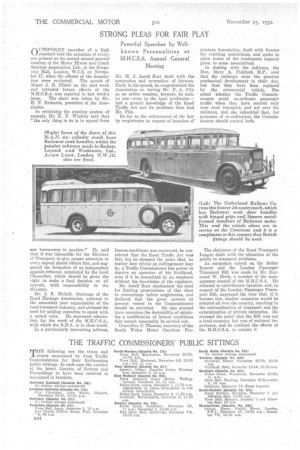STRONG PLEAS FOR FAIR PLAY
Page 62

If you've noticed an error in this article please click here to report it so we can fix it.
Powerful Speeches by Wellknown Personalities at M.H.C.S.A. Annual General Meeting reUTSPOKEN speeches of a high le/standard held the attention of everyone present at the second annual general meeting of the Motor Hirers and Coach Services Association, Ltd., at the Kingsway Hall, London, W.C.2, on November 17, when the officers of the Associa
tion were re-elected. The speech of Major J. B. Elliott on the past work and intended future efforts of the M.H.C.S.A. was reported in last week's issue. The chair was taken by Mr. H. T. Rickards, president of ,the Association.
In criticizing the existing system of nppeals, Mr. R. P. Winfrey said that "the only thing to do is to appeal from one bureaucrat to another." He said that it was impossible for the Minister of Transport to give proper attention to every appeal placed before him, and suggested the formation of an independent appeals tribunal, appointed by the Lord Chancellor, which should be given the right to make a final decision on all appeals, with responsibility to the Mieister.
Mr. J. S. Nichol], chairman of the Road Haulage Association, referred to the somewhat poor organization of the road-transport industry, and stressed the need for pooling resources to speak with a united voice. He expressed admiration for the work of the M.H.C.S.A., with which the R.H.A. is in close touch.
In a particularly interesting address, Mr. H. J. Aston Burt dealt with the suspension and -revocation of licences. Early in his speech, he congratulated the Association on having Mr. F. A. elin as an active member, because, he said, no one—even in the legal profession— had a greater knowledge of the Road Traffic Act and its problems than had Mr. Flin.
So far as the enforcement of the law by magistrates in respect of breaches of licence conditions was concerned, he considered that the Road Traffic Act was fair, but he stressed the point that, no matter how trivial an infringement may be, a Traffic Commissioner has power to deprive an operator of his livelihood, even if it be committed by an employee without the knowledge of the employer.
Mr. Astell Burt emphasized the need for limiting prosecutions of this class to proceedings before magistrates, and declared that the great powers at present vested in the Commissioners
should be curtailed. He also pressed upon operators the desirability of obtaining a modification of licence conditions that cannot reasonably be carried out.
Councillor C. Thomas, secretary of the South Wales Motor Omnibus Pro prietors Association, dealt with finance for resisting restrictions, and spoke in plain terms of the inadequate support given to some associations.
In dealing with the railways, the Hon. Mary A. Pickford, M.P., said that the railways were the greatest mechanical development in their day, but that they have been replaced by the commercial vehicle. She asked whether the Traffic Commissioners could co-ordinate passenger traffic when they, have control only over road transport, and not over the railways, and she submitted that, for purposes of co-ordination, the Commissionerg should control both.
The chairman of the Road Transport League dealt with the education of the public to transport problems.
An outspoken speech on the Salter Report and the London Passenger Transport Bill was made by Mr. Raymond W. Birch, a member of the management council of the M.H.C.S.A. He referred to extortionate taxation and, in respect of the London Passenger Transport Bill, expressed the view thet, if it became law, similar measures would be adopted all over the country, resulting in the nationalization of transport and the extermination of private enterprise. He stressed the point that the Bill wag not a local measure, but was of national importance, and he outlined the efforts of the M.H.C.S.A. to combat it




































































































